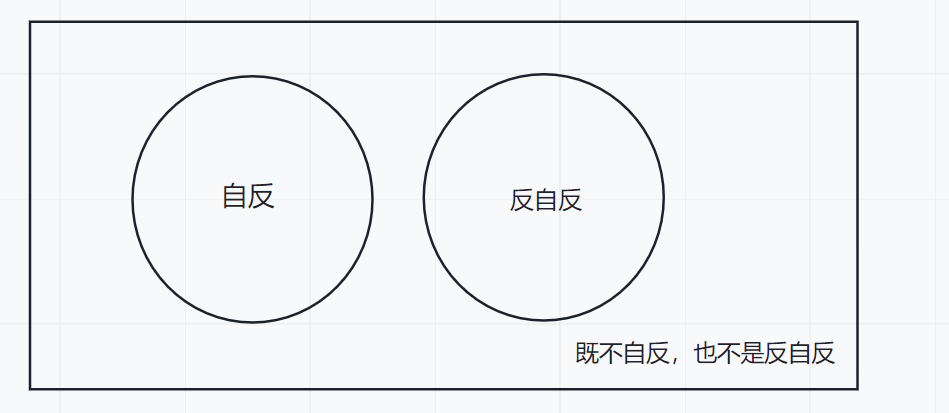前言
- 最近在学习离散数学,在这里给大家总结一下离散数学的集合关系吧
- 自反性
- 对称性
- 传递性
- 并且我用代码给大家实现了一下,但是代码测试的并不多,不晓得有没有bug,大家若留了这方面的作业,可拿去一测😀
一、自反性
- 自反性其实很简单,我先给大家画个图。

- 再给大家举个简单的例子
集合A={1,2,3,4},
**自反的条件:**必须满足集合中元素都有,<1 1> <2 2> < 3 3> <4 4>,其他不用考虑,只有有这四个恒等对,就使自反
**反自反的条件:**若没用任何一个恒等对,它就使反自反的!
**既不自反也不反自反的条件:**有恒等对,但是不全,它就是既不自反也不是反自反。
测试用例:
- <1 1> <2 2> < 3 3> <4 4>自反
- <1 2> <2 3> <2 4>反自反
- <1 1> <2 4> < 3 4>既不是自反,也不是反自反
二、对称性
- 对称性其实可以分成四种情况讨论,还是先看个图吧。

- 还是这个集合A={1,2,3,4}
- 首先要明确:恒等对并不影响对称性和反对称性。
- **对称:**不需要考虑恒等对,若其它都是对称的则就对称。eg:<1 1> <2 1> <1 2>对称
- **反对称:**不需要考虑恒等对,若有任何一对不是对称的,则就是反对称。
- **既对称也是反对称:**只有恒等对的情况下成立<1 1> <2 2>…
- **既不是对称,也不是反对称:**存在对称的情况,但同时也存在不对称的情况,则就是既不是对称也不是反对称<1 1> <2 1> <1 2> <2 3>
测试用例:
- <1 1> <2 2> <1 2> <2 1> <2 3> < 3 2>对称
- <2 1> <1 2> <2 4> <4 2>对称
- <1 2> <1 3> <2 4>反对称
- <1 1> < 3 3> <1 2>反对称
- <1 1> <2 2> < 3 3> <4 4>既对称也是反对称
- <1 1> <2 1> <1 2> <1 3> < 3 3>既不是对称,也不是反对称
三、传递性
- 传递性分成两种情况:废话少说上图!👆

- 若<.x y>∈R且<.y z>∈R,则<.x z>∈R
- 还是这个集合A={1,2,3,4}
- **传递:**满足条件2,或则不满足条件2的“若”情况。这里只要记住如果前面是假的情况,则后面不需要考虑,我们的结果一定为真
- **非传递:**不满足条件2的整体情况,具体给大家举几个例子就明白了
测试用例:
- <1 3> < 3 2> < 1 2>传递(满足条件2)
- <1 3> < 1 4> 传递(因为条件2的若情况为假,有 没用,所以结果就为真,这里需要大家仔细体会)
- 举个例子就是:假如太阳从西边升起,我就写作业。 首先太阳从西边升起肯定是假的,但是我写不写作业都无所谓。我写作业为真,不写作业就为假。所以不取决于前者。
- <1 1> <1 2> <2 1>非传递(因为没有<2 2>,大家需要细心判断)
- <1 1> < 2 3> < 3 4> < <2 4>传递
四、代码实现
import java.io.FileInputStream;
import java.io.FileNotFoundException;
import java.io.IOException;
public class MathTest {
public static void main(String[] args) throws IOException {
Math.judgeOpposite(); //判断自反性
Math.judgeSymmetry(); //判断对称性
Math.judgePass(); //判断传递性
}
}
import java.io.FileInputStream;
import java.io.FileNotFoundException;
import java.io.IOException;
import java.util.*;
public class Math {
public Math() {
}
public static void judgeOpposite() throws IOException{ //判断自反性
String filePath = "D:\\lspd.txt";
int read = 0;
int count = 0;
int key = 0;
ArrayList<Object> list = new ArrayList<>();
FileInputStream file = null;
try {
file = new FileInputStream(filePath);
while((read = file.read()) != '<'){
if(read >= 65 && read <= 122){
key++;
}
}
while(read != -1) {
if(read >= 65 && read <= 122) {
list.add(read);
}
System.out.print((char)read);
read = file.read();
}
System.out.println();
for (int i = 0; i < list.size() -1; i += 2) {
if(list.get(i) == list.get(i+1)) {
count++;
}
}
if(count == key) {
System.out.println("它是自反");
} else if(count == 0) {
System.out.println("它是反自反");
} else {
System.out.println("既不是自反,也不是反自反");
}
} catch (FileNotFoundException e) {
e.printStackTrace();
} finally {
file.close();
}
}
public static void judgeSymmetry() throws IOException { //判断对称性
String filePath = "D:\\lspd.txt";
int read = 0;
int count = 0;
int key = 0;
int k = 0;
int sum = 0;
boolean flag = true;
boolean obj = true;
ArrayList<Object> list = new ArrayList<>();
FileInputStream file = null;
try {
file = new FileInputStream(filePath);
while((read = file.read()) != -1){
if(read == '<')
sum++;
}
file.close();
read = 0;
file = new FileInputStream(filePath);
while((read = file.read()) != -1){
if(read == '<')
sum++;
}
file.close();
read = 0;
file = new FileInputStream(filePath);
while((read = file.read()) != '<'){
if(read >= 65 && read <= 122){
key++;
}
}
while(read != -1) {
if(read >= 65 && read <= 122) {
int a = read;
read = file.read();
read = file.read();
int b = read;
if(a==b){
count++;
obj = true;
}else{
count--;
obj = false;
list.add(a);
list.add(b);
}
}
read = file.read();
}
for (int i = 0; i < list.size() - 2; i += 2) {
for (int j = 0; j < list.size()-2; j += 2) {
if(list.get(i) == list.get(j+3) && list.get(i+1) == list.get(j+2)){
flag = true;
k++;
}else{
flag = false;
}
}
}
if(obj) {
System.out.println("它既是对称,也是反对称");
}
else if(flag){
System.out.println("它是对称的");
}else{
if(k>0){
System.out.println("它不是对称,也不是反对称");
} else{
System.out.println("它是反对称");
}
}
} catch (IOException e) {
e.printStackTrace();
} finally {
file.close();
}
}
public static void judgePass() throws IOException { //判断传递性
HashMap<Integer,Integer> map = new HashMap<>();
String filePath = "D:\\lspd.txt";
int read = 0;
int key = 0;
boolean flag = true;
FileInputStream file = null;
try {
file = new FileInputStream(filePath);
while((read = file.read()) != -1){
if(read == '<')
key++;
}
file.close();
read = 0;
file = new FileInputStream(filePath);
while((read = file.read()) != '<');
int[][] list = new int[key][2];
int i = 0;
while(read !=-1){
for (; i < key &&read >= 65 && read <= 122; i++,read = file.read()) {
for (int j = 0; j < 2 &&read >= 65 && read <= 122; j++,read = file.read()) {
list[i][j] = read;
read = file.read();
}
}
read = file.read();
}
int index1 = 0;
int index2 = 0;
for (int j = 0; j < key; j++) {
for (int k = 0; k < key; k++) {
if(list[j][1] == list[k][0]){
int a = list[j][0];
int b = list[k][1];
for (int l = 0; l < key; l++) {
index1 = 0;
index2 = -1;
if(a == list[l][0]){
index1 = l;
}
for (int m = 0; m < key; m++) {
if(b == list[m][1]) {
index2 = m;
}
if(index1 == index2) break;
}
}
}
}
}
int q1 = 0;
int q2 = 0;
for (int j = 0; j < key; j++) {
for (int k = j+1; k < key; k++) {
if(list[j][0] == list[k][0]){
q1++;
}
if(list[j][0] == list[k-1][1]){
q2++;
}
}
}
if(index1 == index2){
System.out.println("它是传递的");
}else if(q1+q2 == key){
System.out.println("它是传递的");
}else{
System.out.println("它是非传递的");
}
} catch (IOException e) {
e.printStackTrace();
} finally {
file.close();
}
}
}
五、结尾
- 对于几何关系内容就总结这么多,希望大家可以多多练习。如果有不足之处,希望大家多多包涵,多多支持。如果有不懂的地方可以直接私信问我,欢迎来访!
- 这部分内容也可以使用集合表达式进行判断,这里就不在详细讲解
- 我将会继续更新关于计算机的学习知识,喜欢Java的,感兴趣的小伙伴可以关注一下。
- 文章写得比较走心,用了很长时间,绝对不是copy过来的!
- 尊重每一位学习知识的人,同时也尊重每一位分享知识的人。


